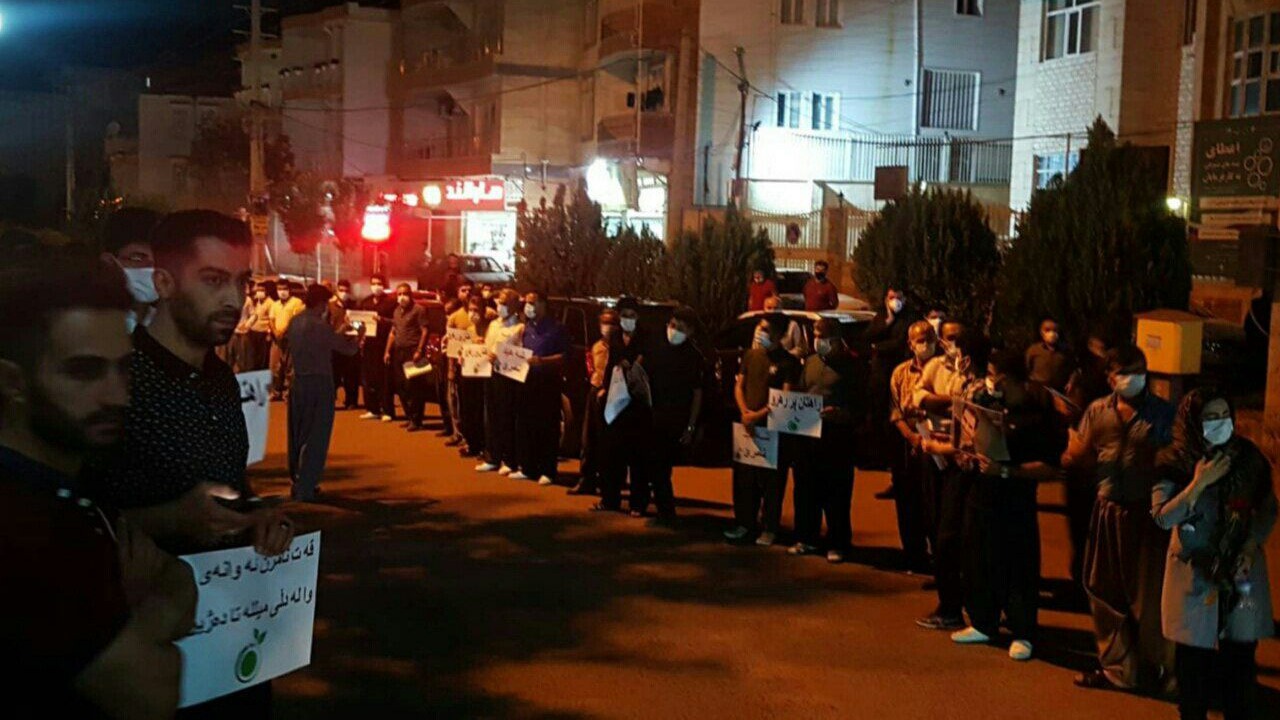Conflicting reports on cause of deaths of Kurdish environmentalists fighting forest fire in western Iran
Three environmentalists died late Sunday while attempting to put out a forest fire in the Kermanshah (Kermashan) province countryside in western Iran.

ERBIL (Kurdistan 24) – Three environmentalists died late Sunday while attempting to put out a forest fire in the Kermanshah (Kermashan) province countryside in western Iran. A human rights watchdog said a day later that the fatalities had been due to landmine blasts in an area where the Iranian government has reportedly planted explosives in purported efforts to combat Kurdish opposition fighters, but a news agency disputed the claim.
“The three environmentalists stepped on Revolutionary Guards-planted landmines while controlling the fires and lost their lives,” Iranian-Kurdish rights group and conflict monitor Hengaw cited an anonymous source as claiming. The incident occurred in Marakhel, which is a mountainous territory located outside the city of Paveh (Pawa) in Kermashan’s west, near the Kurdistan Region border.
Along with new landmines that the Iranian military has placed near areas where Kurdish fighters have been active, as rights groups allege, the border areas are also peppered with mines and other explosive devices that still remain deadly remnants of the eight-year Iran-Iraq war of the 1980s. Either way, Tehran does not appear to have organized any campaign to rid the areas of the mines which routinely cause casualties among rural Kurdish populations.
Iran’s Islamic Revolutionary Guard Corps (IRGC), a branch of the Iranian army under direct leadership of the country’s supreme leader, is in charge of security in Kurdish-majority provinces due to movements calling for autonomy and equal rights for the minority group. Tehran views opposition parties that have fighters regularly engaging the IRGC as “terrorists.”
Official Iranian media has quoted provincial crisis management official Jalil Balayi suggesting that the activists were killed after being “surrounded by fire.”
Pawa County Mayor Paviz Aiydapour told the semi-official Mehr news agency on Monday that flames had overtaken the activists when it changed direction toward them as a result of “strong winds.” Aiydapour also claimed the fire, that has been raging in various parts of the country since the summer season began, had been “contained” by fire-fighting units and members of various security units, including IRGC forces.
A diaspora news agency, IranWire, asserted that the activists had indeed died due to the fire, suggesting that the sound of the blast, as rights groups cited nearby civilians as hearing, may have been due to the gas tank of an air blower being operated by one of the environmentalists exploding.
Such fires have repeatedly torn through the Iranian Kurdish region’s rural areas, with activists claiming local authorities have spared little to no effort to put out the flames or limit the damage caused by them.
At times, outbreaks have taken place due to IRGC shelling of border areas, targeting suspected opposition fighters operating in the border areas. In a similar incident in 2018, four activists succumbed while extinguishing fires in the Mariwan area.
Related Article: Iran claims it ‘cleared’ border area of Kurdish fighters as violent clashes continue
Hengaw claimed further that official Iranian media and local chat groups on Telegram—a cloud-based instant messaging application popular in Iran—had initially reported that the three persons had died due to a landmine explosion. However, the outlets had deleted their reports after a few hours “due to pressure from the security agencies.”
“The Pawa intelligence office had contacted the administrators of Telegram channels of the area and told them: you do not have permission to report on this and can only say they died due to the fire and suffocation,” the rights group’s source alleged.
The three casualties have been identified as Mukhtar Khandani, Balal Amini, and Yasin Karimi. Khandani was reportedly the spokesman of the Zhiway Pawa Society, a local independent organization that raises awareness of environmental issues. Amini was also a member of the group while Karimi worked with the team as a volunteer. Karimi did not die on the scene like the other two, but sustained heavy injuries and passed away later while receiving treatment.
Such activists and advocates for human rights and political freedoms have received repeated threats from local authorities, have been questioned by security forces, and even jailed due to suspected links with Kurdish opposition groups whose fighters operate in the rural areas of western Iran.
Related Article: Iran arrests Kurdish journalist for not using ‘martyr’ to describe Soleimani: Report
On Sunday evening, hundreds of Pawa residents held a march in memory of the three as they accompanied vehicles carrying their bodies, at one point singing Kurdish anthems such as “O’ Martyrs.” One informed source, cited by the Kurdpa news agency, claimed that the authorities had “threatened” the Kahndani’s family to speedily bury the man “before sunrise.”
Vigils were also reportedly held on Monday in the cities of Saqqez and Mariwan for the victims of the latest incident as well as the one in 2018, which claimed the lives of four other activists.
Another rights group, Kurdistan Human Rights Association (KMMK), called the circumstances surrounding the incident suspicious and called for the formation of an “independent committee” to establish the facts about the deaths of the three environmentalists.
Editing by John J. Catherine